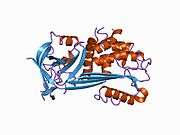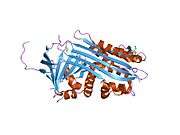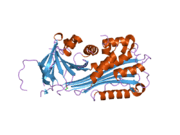Plasminogen activator inhibitor-2
Plasminogen activator inhibitor-2 (placental PAI), a serine protease inhibitor of the serpin superfamily, is a coagulation factor that inactivates tPA and urokinase. It is present in most cells, especially monocytes/macrophages. PAI-2 exists in two forms, a 60-kDa extracellular glycosylated form and a 43-kDa intracellular form.

Fibrinolysis (simplified). Blue arrows denote stimulation, and red arrows inhibition.
It is present only at detectable quantities in blood during pregnancy, as it is produced by the placenta, and may explain partially the increased rate of thrombosis during pregnancy. The majority of expressed PAI-2 remains unsecreted due to the presence of an inefficient internal signal peptide.
Interactions
Plasminogen activator inhibitor-2 (SerpinB2) has been reported to bind a series of intracellular and extracellular proteins. Whether SerpinB2's physiological function is inhibition of the extracellular protease urokinase and/or whether SerpinB2 has intracellular activities remains controversial. At least one of SerpinB2's physiological functions may involve regulation of adaptive immunity.[3]
See also
Further reading
- Rasmussen HH, van Damme J, Puype M, Gesser B, Celis JE, Vandekerckhove J (1992). "Microsequences of 145 proteins recorded in the two-dimensional gel protein database of normal human epidermal keratinocytes". Electrophoresis. 13 (12): 960–9. doi:10.1002/elps.11501301199. PMID 1286667.
- Ellis V, Wun TC, Behrendt N, Rønne E, Danø K (1990). "Inhibition of receptor-bound urokinase by plasminogen-activator inhibitors". J. Biol. Chem. 265 (17): 9904–8. PMID 2161846.
- Estreicher A, Mühlhauser J, Carpentier JL, Orci L, Vassalli JD (1990). "The receptor for urokinase type plasminogen activator polarizes expression of the protease to the leading edge of migrating monocytes and promotes degradation of enzyme inhibitor complexes". J. Cell Biol. 111 (2): 783–92. doi:10.1083/jcb.111.2.783. PMC 2116194
 . PMID 2166055.
. PMID 2166055.
- Samia JA, Alexander SJ, Horton KW, Auron PE, Byers MG, Shows TB, Webb AC (1990). "Chromosomal organization and localization of the human urokinase inhibitor gene: perfect structural conservation with ovalbumin". Genomics. 6 (1): 159–67. doi:10.1016/0888-7543(90)90461-3. PMID 2303256.
- Schwartz BS, Monroe MC, Bradshaw JD (1989). "Endotoxin-induced production of plasminogen activator inhibitor by human monocytes is autonomous and can be inhibited by lipid X". Blood. 73 (8): 2188–95. PMID 2471561.
- Ye RD, Ahern SM, Le Beau MM, Lebo RV, Sadler JE (1989). "Structure of the gene for human plasminogen activator inhibitor-2. The nearest mammalian homologue of chicken ovalbumin". J. Biol. Chem. 264 (10): 5495–502. PMID 2494165.
- Laug WE, Aebersold R, Jong A, Rideout W, Bergman BL, Baker J (1989). "Isolation of multiple types of plasminogen activator inhibitors from vascular smooth muscle cells". Thromb. Haemost. 61 (3): 517–21. PMID 2799763.
- Kruithof EK, Cousin E (1988). "Plasminogen activator inhibitor 2. Isolation and characterization of the promoter region of the gene". Biochem. Biophys. Res. Commun. 156 (1): 383–8. doi:10.1016/S0006-291X(88)80852-0. PMID 2845977.
- Ye RD, Wun TC, Sadler JE (1987). "cDNA cloning and expression in Escherichia coli of a plasminogen activator inhibitor from human placenta". J. Biol. Chem. 262 (8): 3718–25. PMID 3029122.
- Antalis TM, Clark MA, Barnes T, Lehrbach PR, Devine PL, Schevzov G, Goss NH, Stephens RW, Tolstoshev P (1988). "Cloning and expression of a cDNA coding for a human monocyte-derived plasminogen activator inhibitor". Proc. Natl. Acad. Sci. U.S.A. 85 (4): 985–9. doi:10.1073/pnas.85.4.985. PMC 279685
 . PMID 3257578.
. PMID 3257578.
- Schleuning WD, Medcalf RL, Hession C, Rothenbühler R, Shaw A, Kruithof EK (1987). "Plasminogen activator inhibitor 2: regulation of gene transcription during phorbol ester-mediated differentiation of U-937 human histiocytic lymphoma cells". Mol. Cell. Biol. 7 (12): 4564–7. doi:10.1128/mcb.7.12.4564. PMC 368144
 . PMID 3325828.
. PMID 3325828.
- Webb AC, Collins KL, Snyder SE, Alexander SJ, Rosenwasser LJ, Eddy RL, Shows TB, Auron PE (1987). "Human monocyte Arg-Serpin cDNA. Sequence, chromosomal assignment, and homology to plasminogen activator-inhibitor". J. Exp. Med. 166 (1): 77–94. doi:10.1084/jem.166.1.77. PMC 2188630
 . PMID 3496414.
. PMID 3496414.
- Dickinson JL, Bates EJ, Ferrante A, Antalis TM (1995). "Plasminogen activator inhibitor type 2 inhibits tumor necrosis factor alpha-induced apoptosis. Evidence for an alternate biological function". J. Biol. Chem. 270 (46): 27894–904. doi:10.1074/jbc.270.46.27894. PMID 7499264.
- Mikus P, Urano T, Liljeström P, Ny T (1993). "Plasminogen-activator inhibitor type 2 (PAI-2) is a spontaneously polymerising SERPIN. Biochemical characterisation of the recombinant intracellular and extracellular forms". Eur. J. Biochem. 218 (3): 1071–82. doi:10.1111/j.1432-1033.1993.tb18467.x. PMID 7506655.
- Jensen PJ, Wu Q, Janowitz P, Ando Y, Schechter NM (1995). "Plasminogen activator inhibitor type 2: an intracellular keratinocyte differentiation product that is incorporated into the cornified envelope". Exp. Cell Res. 217 (1): 65–71. doi:10.1006/excr.1995.1064. PMID 7867722.
- Akiyama H, Ikeda K, Kondo H, Kato M, McGeer PL (1993). "Microglia express the type 2 plasminogen activator inhibitor in the brain of control subjects and patients with Alzheimer's disease". Neurosci. Lett. 164 (1-2): 233–5. doi:10.1016/0304-3940(93)90899-V. PMID 8152607.
- Ragno P, Montuori N, Vassalli JD, Rossi G (1993). "Processing of complex between urokinase and its type-2 inhibitor on the cell surface. A possible regulatory mechanism of urokinase activity". FEBS Lett. 323 (3): 279–84. doi:10.1016/0014-5793(93)81357-6. PMID 8388810.
- Bartuski AJ, Kamachi Y, Schick C, Overhauser J, Silverman GA (1997). "Cytoplasmic antiproteinase 2 (PI8) and bomapin (PI10) map to the serpin cluster at 18q21.3". Genomics. 43 (3): 321–8. doi:10.1006/geno.1997.4827. PMID 9268635.
- Mahony D, Stringer BW, Dickinson JL, Antalis TM (1998). "DNase I hypersensitive sites in the 5' flanking region of the human plasminogen activator inhibitor type 2 (PAI-2) gene are associated with basal and tumor necrosis factor-alpha-induced transcription in monocytes". Eur. J. Biochem. 256 (3): 550–9. doi:10.1046/j.1432-1327.1998.2560550.x. PMID 9780231.
- Nishida Y, Hayashi Y, Imai Y, Itoh H (1998). "Expression and localization of the urokinase-type plasminogen activator receptor (uPAR) in the human placenta". Kobe J Med Sci. 44 (1): 31–43. PMID 9846056.
References
External links
PDB gallery |
|---|
|
| 1by7: HUMAN PLASMINOGEN ACTIVATOR INHIBITOR-2. LOOP (66-98) DELETION MUTANT |
| 1jrr: HUMAN PLASMINOGEN ACTIVATOR INHIBITOR-2.[LOOP (66-98) DELETIONMUTANT] COMPLEXED WITH PEPTIDE MIMIckING THE REACTIVE CENTER LOOP |
| 2arq: Human plasminogen activator inhibitor-2.[loop (66-98) deletion mutant] complexed with peptide n-acetyl-teaaagdggvmtgr-oh |
| 2arr: Human plasminogen activator inhibitor-2.[loop (66-98) deletion mutant] complexed with peptide n-acetyl-teaaagmggvmtgr-oh |
|
|
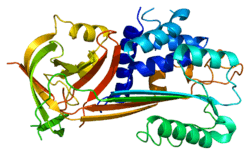
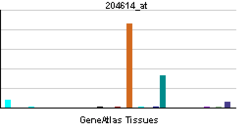

 . PMID 2166055.
. PMID 2166055. . PMID 3257578.
. PMID 3257578. . PMID 3325828.
. PMID 3325828. . PMID 3496414.
. PMID 3496414.